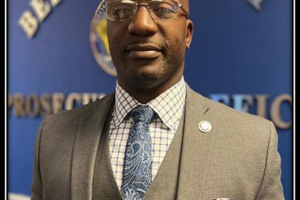On the 18th of July, Attorney General Gurbir S. Grewal announced that a Burlington County Superior Court jury found former senior Correctional Police Officer Steven B. Saunders guilty of the following charges: conspiracy, official misconduct, bribery in official matters, and acceptance or receipt of unlawful benefit by a public servant for official behavior. Saunders, Grewal stated, was convicted of smuggling and selling drugs, drug paraphernalia, more specifically oxycodone, marijuana and tobacco, to the Southern State Correctional Facility inmates. The possession of oxycodone and marijuana also made Saunders the recipient of a third-degree possession with intent to distribute and fourth-degree distribution respectively.
Story By Malik
The former correctional police officer, who saw his position suspended after his November 2017 arrest, witnessed the verdict of his conviction before Superior Court Judge Gerard H. Breland, and will now await his sentence scheduling on the 6th of September.
The convicted 51 year old, as established by the state’s testimony and evidence, collaborated with two other parties in order to smuggle and distribute tobacco and drugs within the Southern State Correctional Facility: Lakovian Shepard, an inmate of the facility, and Tasha N. Swain, the inmate’s girlfriend. Saunders would be compensated for his contraband through payments from the family members and friends of the inmates, who send their funds to a Western Union bank account owned by Swain. Swain would then use the funds to resupply Saunders’ merchandise of tobacco and narcotics, and deliver to the former correctional police officer to repeat the cycle.
Saunders reportedly sold packs of loose tobacco for $75 each and ounces of marijuana for around $1,000 each. On November 20, 2017, the day he was arrested, police reported that Saunders received 40 grams of marijuana, 17 oxycodone pills and $1,000 cash from Swain in a parking lot located in Evesham, New Jersey.
Saunders’ co-conspirators were also charged and convicted. The 40 year old Swain was charged with third-degree distribution of a controlled dangerous substance and Shepard, 44, was charged with third-degree distribution of a controlled dangerous substance. Both parties plead guilty to their respective charges, Swain on the 9th of May 2018 and Shepard, who is still serving 10 years in prison for narcotics distribution, on February 22 of this year.
Attorney General Grewal commented on the Saunders case, saying, “Smuggling drugs and other contraband to inmates undermines security within our state correctional facilities and can seriously compromise the safety of correction officers as well as inmates.Thankfully, Saunders’ scheme was exposed by vigilant investigators in the Department of Corrections, assisted by the State Police and attorneys in the Office of Public Integrity and Accountability. I commend our trial team for securing this verdict, which ensures that Saunders will face a substantial prison sentence.”
Deputy Attorneys General John A. Nicodemo and Jomathon Gilmore brought forth the Saunders case to the state grand jury, and, while supervised by Deputy Attorney General Anthony Picione, Acting Counsel to the Director of the Office of Public Integrity and Accountability, and Deputy Attorney General Peter Lee, engaged in the prosecution of Saunders, Swain, and Shepard.
The case was tried by Deputy Attorneys General Mallory Shanahan and Gilmore, as they represented the Office of Public Integrity and Accountability. Analyst Nathalie Kurzawa assisted them in the case as well.
The Office of Public Integrity and Accountability, the Special Investigations Division of the Department of Corrections, and the New Jersey State Police Official Corruption Bureau-South Unit all indicted Saunders in an investigation. Senior Investigator Patrick Sesulka was the head of investigation for the Department of Corrections.
“Saunders betrayed his badge as well as his fellow correctional police officers at Southern State,” said Director Thomas Eicher of the Office of Public Integrity and Accountability. “We will continue to work collaboratively with the Department of Corrections and New Jersey State Police to guard the security of our prisons by diligently investigating and prosecuting these cases.”
“The inherent dangers of introducing contraband into a prison setting cannot be overstated,” said Department of Corrections Acting Commissioner Marcus O. Hicks, Esq. “A corrupt officer can undermine the integrity of the entire criminal justice system. While the overwhelming majority of New Jersey Department of Corrections staff is hard-working, honest and unwaveringly committed to public safety, it must be understood that there will be severe consequences for those few who would choose to follow the path of corruption.”
“Saunders abused his authority as a senior correctional police officer for his own personal benefit in an elaborate scheme that potentially put lives at risk,” said Colonel Patrick Callahan of the New Jersey State Police. “The New Jersey State Police Official Corruption Bureau will continue to work relentlessly with our law enforcement partners throughout the State to ensure that offenders who betray the trust of the public and their fellow officers will not cast a shadow over those who are upholding the values of the oath that they pledged.”
The length of the prison sentence varies on the degree of the charge, as well as the fine of the charge. The sentencing of a fourth-degree charge can reach up to a year and a half, coupled with a fine around $10,000. Third-degree charges increase the sentencing to three to five years in prison, along with a $15,000 fine. The sentencing of second-degree charges can range from five to 10 years in state prison, and includes a hefty $150,000 fine and a parole ineligibility period of five years.
According to Attorney General Grewal and Director Eicher, the Office of Public Integrity and Accountability allows the public to confidentially report illegal activities such as financial crimes and corruption with a toll-free Tipline 1-844-OPIA-TIPS.















